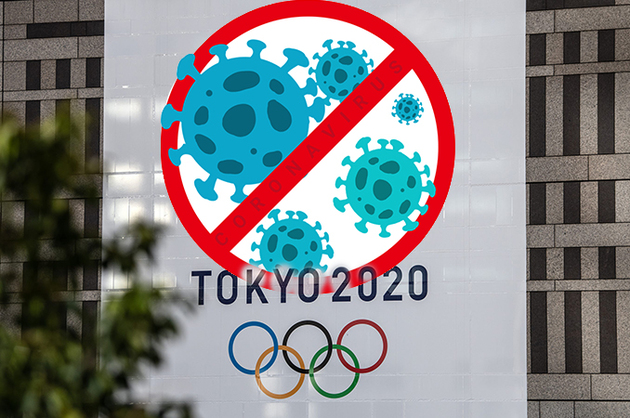It was supposed to be a "short and powerful" two-week state of emergency designed to get Japan's fourth wave of coronavirus infections under control ahead of the Olympics. But after that fortnight had lapsed with infections continuing to place extreme pressure on the medical system, it was extended for another three weeks. Then on May 28, the state of emergency was extended again.
ABC writes that Tokyo, Osaka and several other prefectures across Japan were supposed to be having their first day of relative freedom today. Instead, they will endure another three weeks of restrictions. The measures had some success. For 17 days in a row, infections in Tokyo fell compared to the numbers recorded in early May. "The decline is not enough," Tokyo's Governor Yuriko Koike said. "Now is the time to remember that Tokyo is still in the middle of an emergency declaration." With less than two months until the start of the Olympic Games in Tokyo brings more than 70,000 foreigners into the country, Japan is still fighting to bring coronavirus infections under control.
Japan's stubborn fourth wave
Despite largely voluntary restrictions and lower rates of vaccination, Japan has so far managed to avoid the huge outbreaks of infection experienced in other parts of Asia. But in the last few months, Japan's situation has become more concerning to experts. A total of 10 prefectures are in states of emergency. While Japanese lockdowns are comparatively far less strict than the one experienced by Melbourne residents, some locals are getting fed up with the restrictions. Experts are concerned about the increased movement of people in Tokyo and Osaka as the pandemic drags on. Some restaurants have chosen to openly disregard government requests to close by 8:00pm and not serve alcohol, fearing the collapse of their business because of a delay in receiving promised compensation payments. Hospital capacity on the islands of Okinawa is stretched, with no free beds for severe cases and less severe cases at 88 per cent of capacity. And Japan's second-largest city, Osaka is bearing the brunt of the nation's fourth wave, with hospitals running out of beds and ventilators. Tokyo's hospital system has fared much better, with more ICU beds available. But that could change when foreign athletes — who are not required to be vaccinated to compete — start arriving in Japan's capital.
Olympics organisers insist the games are on
The International Olympic Committee's most senior officials insist the games will be happening, even if a state of emergency is in place in Tokyo. Officials also insist the games will not be a super spreading event. Tokyo 2020 Organising Committee president Seiko Hashimoto said she had received pledges from India — now battling a deadly second COVID-19 wave — and five other countries to vaccinate all their Olympic delegates as a measure against a new variant that has emerged in India. IOC president Thomas Bach has said 80 per cent of the 10,500 athletes expected in Japan would be vaccinated and urged Olympians to get their shots if they could. Delegates must also be tested before and after arrival.
But opinion polls in Japan have consistently shown a large portion of the public does not want the games to go ahead this year. A recent poll in Japan's largest newspaper, the Yomiuri Shimbun, found that 49 per cent of Tokyo residents supported the event. But another poll published in the Nikkei paper yesterday found over 60 per cent of respondents were in favour of cancelling or delaying the games, a result in line with previous polls by other media outlets. Comments by IOC officials appearing to dismiss Japanese concerns have sparked outrage on social media. Last week, Mr Bach told an International Athletes Forum: "Come with full confidence to Tokyo and get ready". He also called Tokyo the "best prepared Olympic city ever". Mr Bach was quickly slammed on Twitter. "I want to say 'shut up'," said one Japanese Twitter user.
More than 6 per cent of people in Japan have received at least one shot. "Under the government's current plan, about 30 per cent of the population would be vaccinated by the end of July," Economy Minister Yasutoshi Nishimura, who is also in charge of the country's coronavirus countermeasures, said. Koji Wada, a government adviser on the pandemic from Tokyo's International University of Health and Welfare, said the Olympics can be held safely to a certain extent. But he believed that criticism could become much stronger if the hospital system becomes strained or the infection spreads during the games. "What we fear is, it's assumed that the mutated virus found in India has already entered Japan and as it could spread more easily than the UK variant," Professor Wada said. "[So] the infection could spread again at places that have been already been taking infection prevention measures — and it won't be easy to stop."
Why doesn't Japan just cancel?
More than 12,000 people have died from COVID-19 in Japan and a growing number of medical organisations are calling for cancellation because of fears about the rise of variants. Japan's government says that is ultimately and unilaterally a decision for the IOC. In fact, several clauses in the contract signed between Tokyo and IOC in 2013 meant the host city could face financial and legal fallout if it pulled the pin.
It is a tough situation for Prime Minister Yoshihide Suga, who has to call an election this year, according to Jeffrey Kingston, a longtime Tokyo resident and director of Temple University's Asia program. "Politically, Suga is in deep trouble for the poor way he has managed the COVID-19 outbreak and the vaccination campaign," Professor Kingston said. "So I think that if he cancels the Olympics, he would [be locked in] downside." Professor Kingston pointed out that Mr Suga has only been in office since September last year. "Here's a prime minister who has accomplished nothing," he said.






